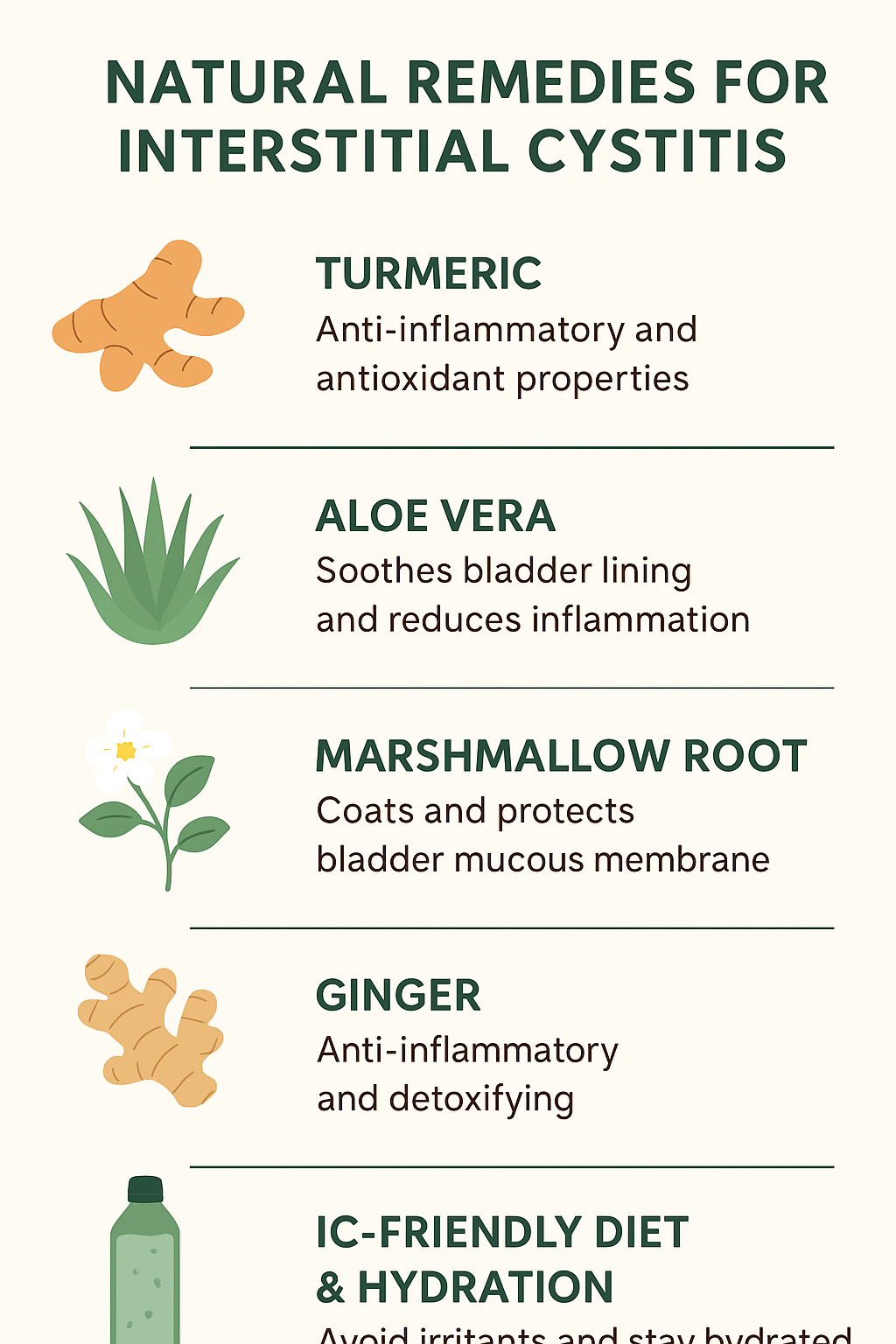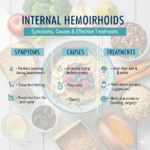Natural remedies for interstitial cystitis (IC) are increasingly being explored by patients who have struggled with years of pain, burning sensations, and constant urgency.
Like everyone else, are you also tired of that horrible, painful burning sensation where no medication seems to work? I completely understand your frustration. It’s heartbreaking to live with symptoms of urgency, pain, and stinging that make daily life so difficult.
Many of us have seen doctors after doctors, gone through endless tests and treatments, yet found little to no relief. That’s why turning to natural treatments and holistic approaches can often be the right step in the right direction.
However, before you begin your self-treatment journey, please keep a few important things in mind:
- Be cautious with any home remedy. Only use what’s safe and tested for IC.
- Expect variation in results. What works for one person may not work for another — IC responses can differ dramatically.
- Be patient. Natural healing is gradual. It’s effective and safe but rarely fast.
Now let’s look at some of the most commonly recommended and highly effective natural remedies for interstitial cystitis.
In addition, if you allow me to add another piece of advice, then I would urge you to be patient. I know you have already been so patient bearing the unbearable pains of interstitial cystitis. However, going the natural route is taking a long journey. Natural does not mean faster. It may be safe and effective yet very slow.

Table of Contents
1. Turmeric – A Powerful Natural Remedy for Interstitial Cystitis
Turmeric is naturally anti-inflammatory and has been used since ancient times for the treatment of wounds, weak bones, joint pains, arthritis and other bone related issues. Due to its anti-oxidant properties, turmeric has been used in the traditional Indian medicines for many health conditions. Turmeric often makes an essential component of the spices in the Asian dishes.
Turmeric is available in capsule form and can be taken orally with water. Eating 2 to 4 capsules a day can help reduce the inflammation in the body. Alternatively, you can add it to your food for extra flavour, aroma and great taste. Many interstitial cystitis patients report improvement of the symptoms by taking turmeric regularly.
Read more: Curcumin and inflammation – NIH
2. Aloe Vera
The National Institute of health reported a study in which 12 patients of IC were give aloe Vera capsules twice a day for 3 months. Only eight people completed the study for its full duration. The study found that seven IC patients had significant IC symptoms relief.
Holland & Barret reports that the Urology Wellness Centre in the US conducted a research, which showed that 90% of patients had significant reduction in their symptoms, while 50% of them said their symptoms has completely gone.
Aloe Vera is also known as burn plant and can sooth the internal wall of the bladder. It also provides soothing relief to the intestine and the whole urinary system.
There is a great deal of anecdotal evidence and thousands of reviews and testimonials about several aloe Vera products. You can take it either in capsule form or in the form of liquid drink.
See also: Mayo Clinic – Aloe Vera uses and safety
3. Marshmallow Root
It derives its name from a Greek word “altho” which means to heal. Marshmallow root and leaves have been used in the traditional herbal medicines for centuries with high benefits. The root of the herb is considered a panacea for several conditions with intestinal and urinary disorders on top of the list. It contains mucilage as its main constituent, which coats the mucous membrane of bladder and thus prevents irritation and inflammation. Another ingredient in marshmallow is called tannins, which creates a protective barrier on the mucous membrane. The herb also contains another beneficial substance called pectin, which helps in eliminating toxin in the body. So, marshmallow attacks interstitial cystitis in two ways i.e. by protecting the mucous membrane and detoxifying the body.
Nutritionally, it has several nutrients such as:
- Vitamin A
- Calcium
- Magnesium
- Selenium
- Iron
- Vitamin C
- Manganese
- Phosphorus
- Potassium
- Zinc
- Niacin,
- Silicon
- B1
- B2
Marshmallow root can be taken in the form of tea or capsules. Most people report that the tea form works best for them. It heals the tissue and soothes the lining of the bladder, kidneys and urethra. It is easy to make Marshmallow tea by simply adding 1 to 2 teaspoon of the herb to hot water and leaving it simmering for 10 minutes. Taking it in the capsule form is said to work best for intestinal issues.
To prepare:
Add 1–2 teaspoons of dried marshmallow root to hot water, simmer for 10 minutes, and drink twice daily.
More info: Healthline – Marshmallow Root Benefits
4. Ginger
Ginger is among the herbs, which is very beneficial for inflammation, sickness, digestion and elimination of gas. It is also considered one of the top detoxifying herbs. Many cleansing programs and detox diets list ginger as one of the ingredients. Building up of toxins in the body is the root cause of several conditions including interstitial cystitis. Ginger contains gingerol and shoga, which are anti-inflammatory and anti-spasmodic, and help soothe the digestive system.
Ginger can be eaten by adding it directly to your curries as a spice. It is also available in capsule form. Ginger tea is perhaps the best way to consume it. Simply add some grated pieces of ginger to hot water and leave it simmering for 10 minutes.
It is worth mentioning to note here that different people report different reactions and response to the use of Ginger especially in the treatment of IC. Some people report to have found ginger soothing and relaxing for IC while others have reported quite the opposite. If ginger happens to increase your IC flare-ups, it is recommended to use it in small quantities in the beginning.
Ginger is also great to add to your bath. Just add 2 tablespoon of ginger powder to your bath for relaxing your body. The body will absorb ginger through the skin giving it a soothing relief.
You can consume ginger as:
- Tea: Add grated ginger to hot water and simmer for 10 minutes.
- Food: Use fresh ginger in curries, soups, or smoothies.
- Bath soak: Add 2 tablespoons of ginger powder to a warm bath for muscle relaxation and toxin release.
Learn more: Cleveland Clinic – Health Benefits of Ginger
5. Cayenne pepper
This one is truly controversial. There are conflicting reports from people taking cayenne pepper for interstitial cystitis. Some people have reported very positive results and found it numbing to their bladder, while others reports indicate to have increased the flare-ups. Just like with the other natural remedies, cayenne pepper reacts differently to different people.
If you decide taking cayenne pepper for the treatment of you interstitial cystitis, make sure that you start from a very small amount. Once you know it is soothing, it means it is healing. Slowly increase the amount to a level you think is right.
f you decide to try it, start with a very small dose and observe your body’s reaction before increasing.
Read more: PubMed study on Capsaicin and pain modulation
Additional Natural Approaches
In addition to the five main herbs above, many IC patients find long-term relief through diet and lifestyle adjustments:
IC-Friendly Diet
- Avoid trigger foods such as caffeine, alcohol, citrus, artificial sweeteners, and spicy foods.
- Focus on alkaline, anti-inflammatory foods like leafy greens, oats, and coconut water.
- “What to Eat | Interstitial Cystitis Association” https://www.ichelp.org/understanding-ic/diet/what-to-eat/ ichelp.org
- “Potential Diet Triggers” https://www.ichelp.org/understanding-ic/diet/diet-triggers/
Stay Hydrated
Drink water consistently throughout the day, but avoid overhydration. Sipping small amounts of water can flush irritants from your bladder without causing urgency.
Manage Stress
Stress can trigger IC flares. Gentle yoga, deep breathing, and mindfulness help calm the nervous system and reduce symptoms.
Conclusion
Natural remedies, for the most part, are safer and effective if taken the right way. Before taking the natural route, it is very important to be clear about a few things. Natural does not mean it is 100% safe. No, natural remedies can be harmful if misused or abused. You must exercise great care and make sure that you are taking the right remedy in an appropriate dosage. Never overdose yourself blindly assuming that all natural remedies are safe.
Start with one remedy at a time and if you find it working, add another combination. This way you will come to know what works and what does not. Also, bear in mind that what works for one person may not work for others. You will have to try different stuff before you find the one, which works for you.







Leave a Reply